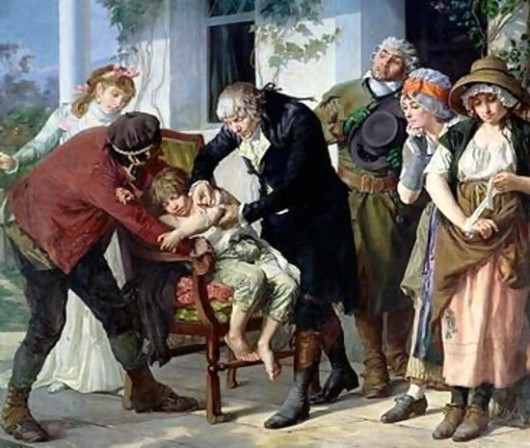The progress of today’s Ebola epidemic is largely being tracked through the commentary of one fortunate Ebola survivor: the physician Kent Brantly, stricken as he himself cared for Ebola sufferers. This disease, which to date has sickened about 7,500 person and killed 3,400 of them, bears some resemblance to another terrifying, contagious, viral disease: smallpox. Pictured here, Edward Jenner in 1770, the English physician and scientist who pioneered the world’s first smallpox vaccine.
During the 1900s, and as recent as the 1970s, smallpox caused some 300–500 million deaths. Unfathomable. Twice the population of the United States rapidly died from pneumonia, respiratory failure, and brain infection. With a mortality rate similar to Ebola, of all those infected 20–60 percent – and over 80 percent of infected children – died from the disease within ten days.
And like Ebola, the progress of controlling the world wide smallpox epidemic in personified through the life of one remarkable man: the physician William Foege. Clearly controlling smallpox was a global effort. But at the helm, Dr. Foege is credited with “devising the global strategy that led to the eradication of small in the late 1970s”. His book, House on Fire: The Fight to Eradicate Smallpox, documents to the progress of science and public health intervention over a disease responsible indescribable loss for all of human history.
On my upper left I carry a small dark scar. It’s the remnant of my original smallpox vaccination. The dwindling number of people today who even received such a vaccination is testimony to the hope transmitted to us through people like William Foege. Such a vaccine scar is also a message of reassurance that amid today’s epidemics there continues to be well-founded hope.
Reference: Paulson T (March 9, 2006). “Carter hails UW’s shy hero Foege. New building named for health leader is dedicated”. Seattle Post-Intelligencer. Retrieved September 26, 2009.

